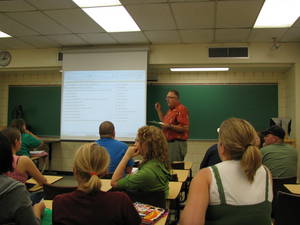Courses
Biological Research Principles (Biol 884)
An exploration of critical thinking and creating problem solving which evaluates various approaches to research design. The course includes discussion, research design, analyses of primary literature and preparation and presentation of graduate research proposal.
Fisheries & Wildlife Management Techniques (477/677)
Students will learn techniques used in the study and management of fish and wildlife populations. Students will design an independent field research project to be executed during a field trip (typically 2-4 days in length). Students will prepare a written research proposal and final paper based on original research conducted during the field trip. The proposal and paper will also be presented orally. Students will also learn to maintain a professional field journal. Finally, students will critique and discuss peer reviewed papers. Syllabus

Field sampling with students.
Conservation Biology (Zoology 475/675)
Conservation biology is an integrative approach to the study and conservation of biodiversity. This science includes numerous disciplines from the biological and social sciences; such as genetics, ecology, behavior, economics, sociology, philosophy and political science. This course will focus on biological topics but students will also be exposed to important issues in the social sciences. The interaction of science and management is emphasized throughout the course. Syllabus

Teaching Conservation Biology at NDSU.
Advanced Conservation Biology (Zoology 750)
Conservation biology is one of the fastest growing disciplines within the applied environmental sciences. This course focuses on emerging areas of research in Conservation Biology. In the past, the course has been designed around a field trip to western Nevada and Southern California. In 2009 and 2012, the class included a tour of Devils Hole - home to one of the most endangered vertebrates - the Devils Hole pupfish. We attended international meetings of conservation biologists focused on the evolutionary change in human-altered environments (2007) and conservation of desert aquatic systems (2009; 2012 - Desert Fishes Council). in 2009, 2012 and 2018, my class was provided the rare opportunity to visit Devil's Hole - home to the endangered Devil's Hole pupfish http://www.ndsu.edu/news/banner_stories/devilshole/ Syllabus

2009 Class at the Mono Lake, California.